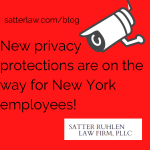@workplacelawyer Can the boss require you to be screened? #syracuseworkersrights #workplacelawyer #workplaceprivacy ♬ original sound – WorkplaceLawyer
Tag Archives: #workplaceprivacy
New York Law Restricts Employer E-Spying

New York State recently passed a law requiring employers to give notice to employees if they monitor employees’ telephone, email, and internet activity.
Section 52-c of the New York Civil Rights Act requires employers to provide written notice of e-monitoring individually to new employees. If the employee doesn’t sign an acknowledgement of the notice, the notice is invalid. Further, the notice must inform the employee of monitoring of telephone, email, internet, or use of any electronic device (including computer, telephone, wire, radio or fax). Notice must also be posted in a conspicuous spot in the workplace.
The employer does not have to inform employees about computer system maintenance and protection such as spam filters and volume controls.
Realistically speaking, this means an extra form for New York employees to sign during the hiring process. If a new hire refuses to sign, in all probability the employer could refuse to keep the person on the job. Additionally, there is no private right of action, meaning employees can’t individually sue employers for violations of this law. But employees can report employers to the New York State Attorney General, who can impose monetary penalties. Repeat offenders will be assessed increasingly stiff penalties.
The law goes into effect on May 7, 2022. If you are concerned about how your employer is monitoring you, it’s not a bad idea to call the attorney general or speak with a workers’ rights attorney in your jurisdiction.

